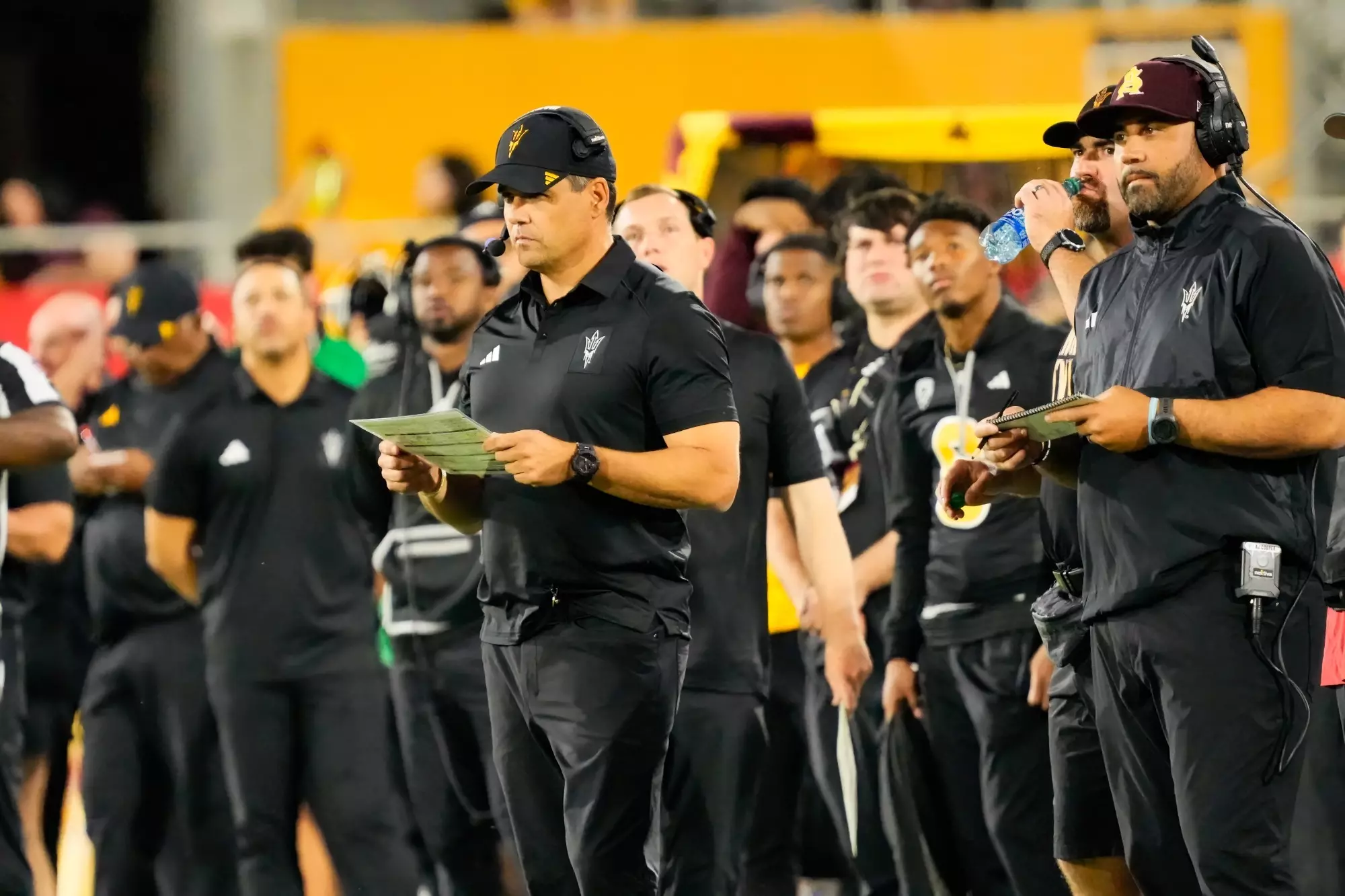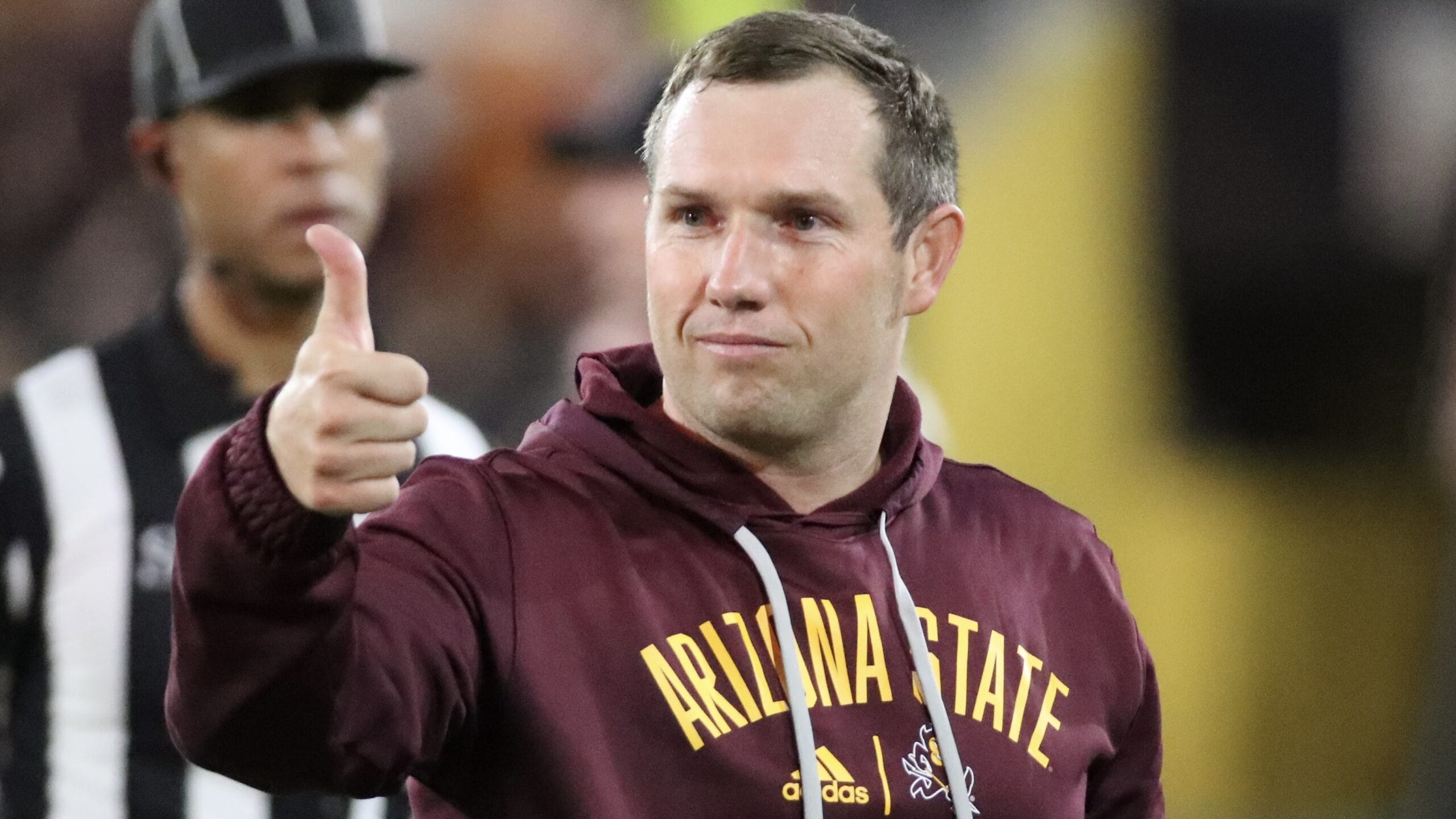The Arizona State Sun Devils and head coach Kenny Dillingham have agreed to a new 5-year contract, finalized the night before the team’s College Football Playoff quarterfinal matchup against Texas in the Peach Bowl, according to ESPN’s Pete Thamel.
ASU athletic director Graham Rossini later confirmed the news to fans in Atlanta, celebrating the contract extension as recognition of the program’s remarkable turnaround under Dillingham in his second season.
Kenny Dillingham’s new contract follows a performance-based structure with incentives that could extend the deal to as many as 10 seasons, as reported by Arizona Sports’ John Gambadoro. The agreement also includes signing, retention, and performance-related bonuses.
According to Chris Karpman of SunDevilSource.com, the deal features a salary increase, with Gambadoro noting that Dillingham’s pay will rank among the top three salaries for Big 12 coaches.
Dillingham, 34, is a Phoenix-area native and an Arizona State University alumnus who graduated from Chaparral High School. He began his coaching career as an assistant at ASU in 2014 and gained experience with stints at Memphis, Auburn, Florida State, and Oregon. After serving as Oregon’s offensive coordinator in 2022, Dillingham returned to ASU as the Sun Devils’ head coach.
What led to Arizona State awarding Kenny Dillingham an extension?
Kenny Dillingham has orchestrated a remarkable turnaround for the Sun Devils’ football program.
After a challenging 3-9 season in his first year, ASU rebounded with an impressive 11-2 record heading into Wednesday’s College Football Playoff quarterfinal, secured by winning the Big 12 title in the school’s inaugural full season in the conference. This success defied preseason expectations, as the team was projected by the media to finish last in the conference.
Dillingham’s leadership propelled running back Cam Skattebo to a fifth-place finish in the Heisman Trophy voting, while redshirt freshman quarterback Sam Leavitt has already earned spots on early watchlists for the 2025 Heisman.
In November, ASU extended the contracts of offensive coordinator Marcus Arroyo and defensive coordinator Brian Ward for three years, reflecting Dillingham’s commitment to supporting his coaching staff before negotiating his own deal.
What trajectory is the Arizona State football program on?
The contract also includes provisions to ensure financial stability for future staff recruiting efforts and a commitment to being a “full participant in revenue share,” as reported by Pete Thamel.
Revenue sharing is a key aspect of the upcoming House v. NCAA case, which is anticipated to be resolved in April. Alongside this development, Arizona State has committed to increasing its football scholarships by 20, bringing the total to 105.
Meanwhile, several current players have already expressed their intent to return to ASU. Defensive stars Clayton Smith, C.J. Fite, and Myles Rowser are among those staying, while quarterback Sam Leavitt and wide receiver Jordyn Tyson have also indicated they are locked in for next season in Tempe.
The Sun Devils are not expected to lose any key contributors from their depth chart following the season.
This strong player retention stands out, especially amid reports of lucrative offers in the transfer portal, such as a $6 million deal rumored for Texas quarterback Quinn Ewers, who is widely anticipated to declare for the NFL draft after the Longhorns’ postseason.
ASU has been proactive in addressing roster needs during the current transfer portal cycle, adding talent across several positions, including wide receivers Jalen Moss (Fresno State) and Noble Johnson (Clemson), running back Kanye Udoh (Army), tight end Khamari Anderson (Kentucky), and kicker Jesús Gómez (Eastern Michigan).
The Sun Devils’ incoming freshman class is ranked eighth in the Big 12 by 247 Sports, and they are already making strides for the future, securing a commitment from 2026 quarterback prospect Jake Fette, ranked No. 142 nationally.



